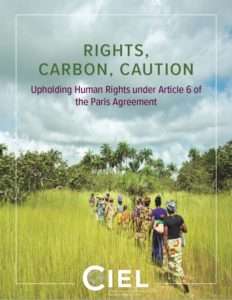
The climate crisis is unfolding here and now. Preserving our collective future demands urgent and ambitious action, and the Paris Agreement is perhaps the best hope we have of coming together to reverse and prevent the catastrophic effects of warming. Achieving the Paris Agreement’s target of limiting warming to 1.5°C is crucial, if still risky for human rights and the environment. Doing so will require a dramatic acceleration of efforts to reduce greenhouse gas emissions from all sectors globally.
As it stands, the mitigation measures outlined in Nationally Determined Contributions (NDCs) under the Paris Agreement would overshoot the target, leaving the world on course for warming in excess of 3°C by the end of the century. This reality necessitates exercising caution around any proposals to create “market mechanisms” that allow for offsetting or trading of emissions reductions between countries — a system that is fundamentally at odds with deep decarbonization.
At the 26th Conference of the Parties (COP-26) to the United Nations Framework Convention on Climate Change (UNFCCC), States parties are poised to finalize the framework regulating these mechanisms under Article 6 of the Paris Agreement. In so doing, they are obligated to consider their legal and moral duty to protect human rights through ambitious climate action and from adverse impacts of that action. Rights, Carbon, Caution: Upholding Human Rights under Article 6 of the Paris Agreement lays out the minimum requirements that any proposed rules must meet to ensure that any such mechanisms uphold human rights. It does so through the lens of three key “pillars”:
- Strong rules for public participation,
- Social and environmental safeguards, and
- Independent grievance mechanisms at the project and international level.
Read the full, designed report here.
Read an accessible version of the report here.
Published in February 2021.
